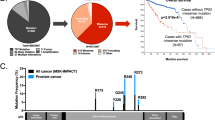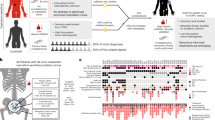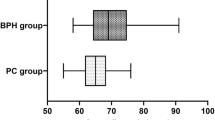Abstract
A study was made of the incidence of p53 mutations in Japanese males with prostate cancer or benign prostatic hyperplasia. Polymerase chain reaction single-strand conformation polymorphism (PCR-SSCP) was used as a primary screening technique with gene sequencing being carried out in positive cases. Two out of 21 prostate cancers (9.5%) were found to have p53 mutations. These were stage B2 and D2 prostate cancers. No abnormalities were found in the remaining cases or benign prostatic hyperplasia. Mutations of the p53 gene would thus appear infrequent in the tumourigenesis of primary prostate cancer.
This is a preview of subscription content, access via your institution
Access options
Subscribe to this journal
Receive 24 print issues and online access
$259.00 per year
only $10.79 per issue
Buy this article
- Purchase on SpringerLink
- Instant access to the full article PDF.
USD 39.95
Prices may be subject to local taxes which are calculated during checkout
Similar content being viewed by others
Author information
Authors and Affiliations
Rights and permissions
About this article
Cite this article
Uchida, T., Wada, C., Shitara, T. et al. Infrequent involvement of p53 gene mutations in the tumourigenesis of Japanese prostate cancer. Br J Cancer 68, 751–755 (1993). https://doi.org/10.1038/bjc.1993.423
Issue date:
DOI: https://doi.org/10.1038/bjc.1993.423
This article is cited by
-
Pathologic characteristics of prostatic adenocarcinomas: a mapping analysis of Korean patients
Prostate Cancer and Prostatic Diseases (2003)



